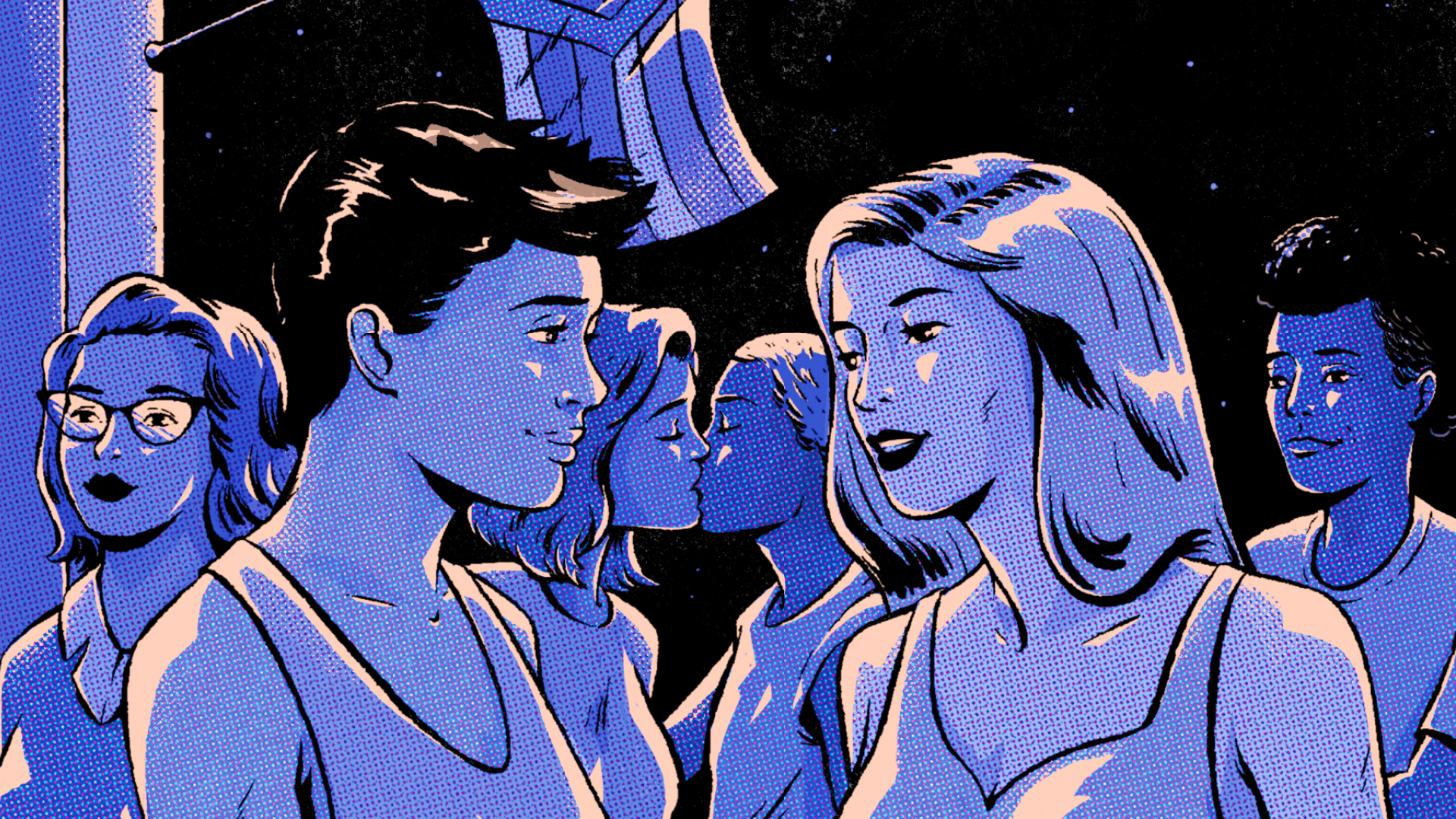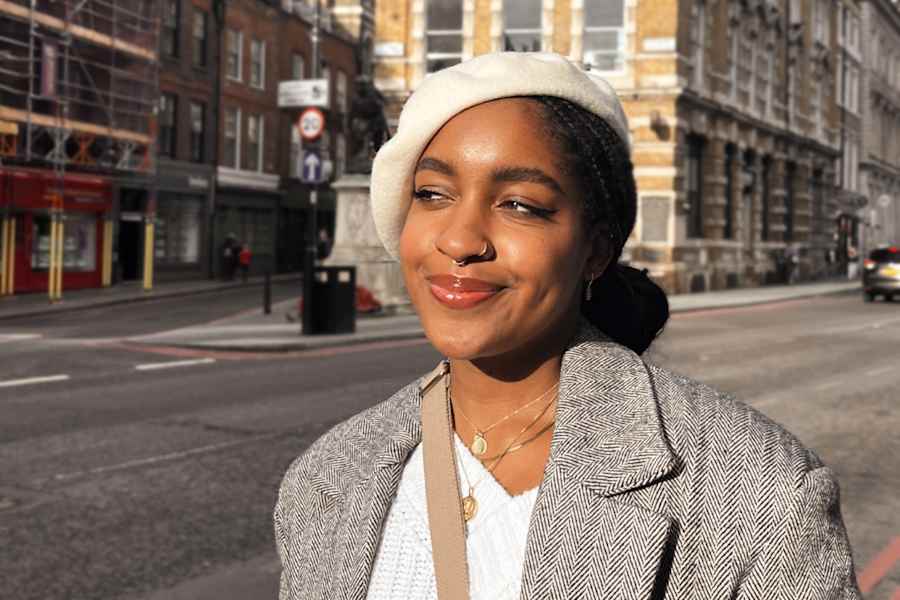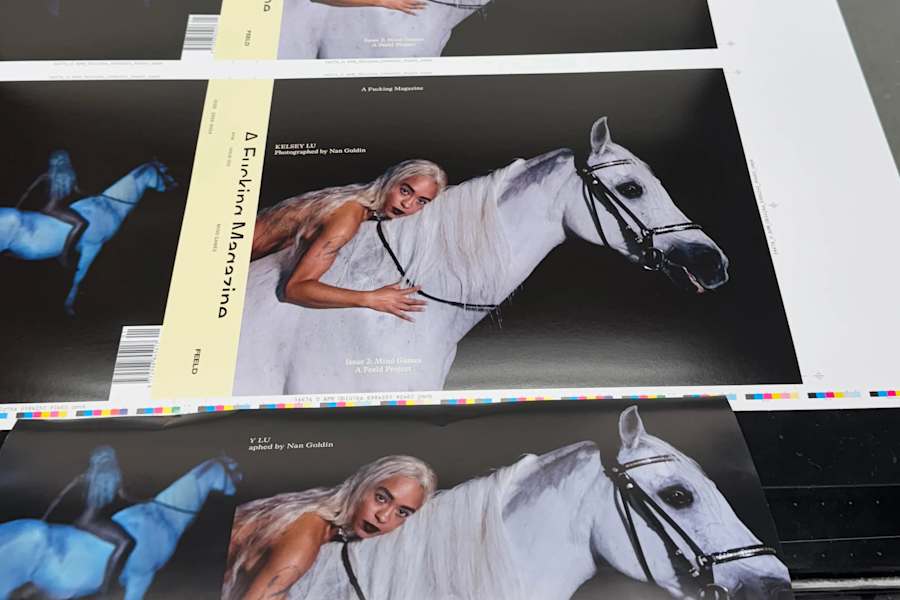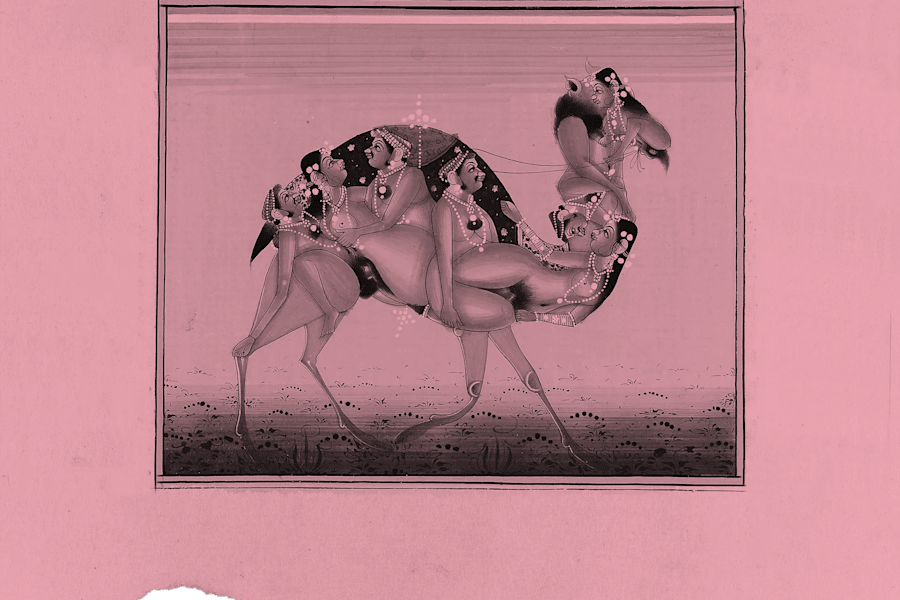
The author of Moby Dyke speaks to Anna Fitzpatrick about her epic quest to visit the last remaining lesbian bars in the United States.
There are, depending how you count, about two dozen lesbian bars left in the United States, about a tenth of the number that existed in 1987. Writer Krista Burton spent a recent year of her life traveling to all of them, determined to figure out exactly why they seemed to be disappearing. She had a lot of fun in the process: meeting queers across the country, having intimate conversations shouted over a ubiquitous Britney Spears soundtrack, and reveling in drag shows and community following endless lockdowns. The result is Moby Dyke: An Obsessive Quest To Track Down The Last Remaining Lesbian Bars In America, part travelog, part memoir, part cultural criticism, and part party reporting.
Burton was the creator of the cult blog, Effing Dykes (named Best LGBT Blog by the 2011 Bloggie Awards), and has been a frequent contributor to Rookie, the New York Times, and Autostraddle. She’s a femme extraordinaire, with a style somewhere between Marilyn Monroe and eclectic auntie in both her fashion and her writing.
Burton and I have known each other for years. I first spoke to her about her Moby Dyke project a year ago, when I was writing about disappearing sex parties for women who love women. She had just visited the last bar on her tour, and I asked about her theories on why such spaces were disappearing. Some of the reasons were bureaucratic: bar owners retired or passed away with no succession plan in place, or couples who co-owned a bar broke up. Gentrification plays a role, as it so often does.
Then there were the many bars that once billed themselves specifically as lesbian that have since rebranded to be inclusive to the wider queer community. “Some people have a problem with me identifying as a lesbian because I’m married to a trans man,” she told me a year ago. (Burton’s husband, Davin Sokup, is a city councilor for Northfield and joined her for roughly half the bars on the trip.)
Burton goes deep into all these issues in her book, as well as other stories: she writes about her own harrowing coming out story, and femme invisibility within the lesbian community. But Moby Dyke is an optimistic book, celebrating queer joy, community spaces, and the lesbian experience which is not and could never be universal. Normally, when I interview an author, I have a copy of their book by my side, but I had brought Moby Dyke to a sapphic party my friend threw in Toronto at the beginning of Pride month, where it was passed around the crowd.
One of the party attendees was visiting from Ohio, and had flipped to the chapter of the book in which Burton attends trivia night at Slammers Bar in Columbus. In the book, the trivia host asks a question about her cat, Kiki. In real life, the guest at the pride party in Toronto excitedly told me that she knew this host, that she couldn’t believe her friends and their experiences had been captured on the page. I have no idea what has happened to my copy of the book, but I assume it’s going on a gay journey of its own.
Burton and I talked in the week following her book’s release to chat about karaoke, Parisian lesbians, and how she would decorate her dream bar.
When we last spoke you had just come back from Oklahoma, and were sitting down to write the book. How has the last year gone?
I am so thrilled to be on the other side of that. Coming home from Oklahoma, I was in a semi-panicked state. I knew the book was due in a month, maybe two months. When I talked to you last year, I was just facing the reality of the fact that I just had to write this book. I was freaking out. Now that it's done, I feel fantastic.
You had a really supportive partner who made it happen, which I thought was really beautiful. It was a community effort, via your partner and friends, to get you to these bars and write this book.
Ten outta ten for Davin. When he wanted to run for state senator , I remember looking at him and being like, "Why?" He was so supportive with my project that it made me in retrospect realize oh, this is what supporting your partner looks like. It's jumping in and trying to help them achieve their goals. I was like, I feel so grateful and I'm going to go ahead and gently shame myself. He was incredible, and there's no way I could have written the book without him.
Literally making the Google spreadsheet. So much gets started with opening that tab.
Nothing scares me more than someone pulling out a calendar and saying, let's talk about dates. That is my worst case scenario. For your partner to know that about you, and to simply say, “I will take care of this part because I happen to be great at it,” is amazing.
I believe every bar you attended was in a city—at least a mid-size city. How important are cities to queer communities?
I think they're very important. You hear the trope all the time of somebody growing up in the middle of nowhere America or Canada, and just being like, I grew up in a tiny area, I don't know any queer people, and then I moved to a city and then yay, hurray, now I'm gay! Not now I'm gay, I was always gay. But you can express yourself more when you move from the country to the city. I think cities have always been gathering places to find your own people and to express yourself in a more full way because you get to reinvent yourself a bit. You are able to be more yourself in a way you didn't feel like you could at home.
You also have moments where you talk about not assuming that rural areas are just full of homophobes. Queer people live there as well, and queer people can thrive there. As someone who did live in multiple cities and is now living in a more rural area as a visibly queer person, what's that been like?
I currently live in Northfield, Minnesota. I have a house here. This is a small town. I love it. It's like a strange little liberal bubble in rural Minnesota. We are forty-five minutes from the Twin Cities. If you want to go to Northfield, you have to want to go to Northfield. There's no easy way in. You have to drive.
Just because you live in a small town doesn't mean that it's super conservative. It just depends on the small town, honestly. There's a small town twenty minutes from here that's super conservative. Like, unbelievably so. I have really loved living here, and I didn't know how much I needed to chill the fuck out until my options of what to do in the evening were reduced to two options. And then I'll just ignore both and hang out on my deck. It's great.
I also think of you and Davin living your life out there, and I think about how, to queer kids in Northfield, the two of you are visible beacons of queerness, and how valuable that is.
Davin is extremely visible because he's on the city council. He's openly trans in an area where that has not been a thing before, in regard to a government official. I think cities are where I would want to live if I was in my twenties, and let's say, on the prowl. There's no way. I would want places where I could congregate with lots and lots of people. People I could date and people I want to hang out with and build a little queer community.
Now that I'm older it's easier to imagine building queer community where I am, in a small town, but in my twenties? In my thirties? No way.
I think for a lot of people, there's an idea that your twenties are the party years. You move to a city, you go to bars for drinking and dancing. As you get older, you settle down and nest. That's not true for every straight person, but it is a commonly accepted narrative. But for a lot of queer people who maybe come out later in life, or for trans people who may not have been able to have lived as their authentic self, there can be this feeling of a missed youth.
What was interesting to me about your project is that there was no uniformity among the bars you visited. There were some that were clubs with dancing, and there were some that felt like the bar from Cheers. Could you speak a little to the range of clientele that you met, especially in terms of ages and experience?
Some places were definitely, at least on the nights I was there, a crowd of people who were thirty and under. But that was only the case a couple of times. The majority of bars were deeply mixed when it came to age. I was very surprised at how many clearly older people were in these bars and having a great time. I was also impressed because there's that stereotype that lesbians stop going out. I didn't find that to be true at all. I went to a bar in Arizona, Boycott Bar in Phoenix, where it was two-stepping night, and there were seventy-year-olds dancing with twenty-two-year-olds. At Blush and Blu in Denver, there were quite a few older queers there. I found that to be the same at the majority of the bars.
If you missed out on going to the bars in your twenties and thirties, I don't think that those spaces aren't for you. You can still go now and it's great. I saw a lot of that. There are so many people who are—thank you TikTok—just starting to figure out that they might be queer, or just coming out at a time in their lives where they didn't have that freedom to experiment, and I kept meeting them out in the bars and the spaces.
There's a surprising fact that Oklahoma has so many lesbian bars. It’s second only to New York. Surprising, of course, depending on people's preconceived notions of red states. In the last year, the threats of living in America have only gotten scarier, particularly when it comes to the anti-abortion and anti-trans legislation being passed. Could you talk about the misconceptions that people might have about what they might find at a lesbian bar in Oklahoma, and how these spaces exist in their own environments?
I think some people might suspect that these bars would be real shit kicker bars, or conservative except for being gay. I found that the redder the state, the more typically welcoming these bars were. I felt the bars in the deep red states were extreme oases, specifically because it was one of the only spaces to be openly queer. They felt like actual havens. Outside of the bars, everything is just right up in your face. There are Bible verses everywhere, people are working God into regular conversations. Not always and not everywhere, but inside the bars it felt like a little heaven, and people were just thrilled that you were there. They were very openly like, "Hi, come sit down! What's your name, why are you here?" Just curious about you in a way that I didn't experience in big city blue states.
I think a lot of queer people in red states get asked, "Why don't you just leave?" Not that I would blame anyone for leaving, but these are people's homes.
I used to ask that question in my twenties. "If you don't like it, why don't you leave?" It is a question of whether or not you can. Physically and financially being able to leave is a big deal, and also, your whole support network might be there. Your entire family might be there. Maybe this is where you are for now. That's something you've committed to. I think people who stay and fight are very important.
I've been asking you so many heavy questions, so let me lighten it up. What were some of your favorite activities you did in lesbian bars on the road?
I did dildo races. That was really, really fun. I saw an incredible drag show in Bloomington, Indiana at the Back Door. I want to say that I had an amazing time at Boycott Bar in Phoenix, two-stepping with my sister who was rapidly getting drunk. The messiest dance floor that I saw was a dead tie between My Sister's Room in Atlanta and Sue Ellen's in Dallas. Both places were extremely fun people-watching. People were out to party.
Have you heard from any of the bars since your book came out?
Only a couple bars have contacted me. We sent out a book to all of them, and I wrote them all a little note. But it's pretty early. The book came out last week. I did hear from The Backdoor in Bloomington, Indiana. The owner reached out and contacted me and was like, "My mom heard you on NPR. I had no idea our bar was one of your favorites. I'm so glad that you liked it so much." And then they mentioned they had never seen the book because one of their employees had immediately taken it. I was like, "That's great! I also do want you to read it."
In the conclusion of your book you also talk about how during the writing of it, all these new bars started opening up. You were so happy, but were also like, "Oh my god, could everyone just pause for two seconds before I get my edits in?"
Yeah it was like, freaking me out when I would open Instagram, because too many people would DM me about new bars. Lots are opening. The second I turned in the book, the rumors I heard about two new bars opening in LA came to fruition. Man, a bunch have opened. The Sports Bra in Portland opened and ugh, I'm desperate to go there. Doc Marie’s opened and then closed and then opened again, also in Portland. And people keep asking me, "Have you been to this one? Have you been to this one?" No, I haven't! I'm ready though.
What I'm hearing is: a sequel?
I'm really biting my fist not to propose a Moby Dyke where I go around the world. I lived for a year in Taiwan—that was in like 2007, 2008—and the lesbian bars in Taiwan were incredible.
Tell me more.
If you've ever had a fantasy where you lived in 1950s butch/femme culture, except without the 1950s politics, you should go to Taiwan. The clubs there, when we were going, you needed to have a friend who was a known person to bring you to the bar. You had to know the password. These clubs were in hidden locations, and the culture was extremely butch/femme. I was in shock! I have every assumption that lesbian bars around the world would be incredibly interesting.
Have you been to bars in other countries?
I went to a lesbian bar with my friend Tawnya in Paris. We had a great time. First, it was like everywhere else: everyone saw us come in and promptly pretended they hadn't seen us. Tawnya kind of refuses to be ignored. She's a burlesque dancer that has done really, really well with that. She was dressed in an extremely skintight crop top situation, with very high heels. Within about I'd say ten minutes, we were having drinks with all these French girls and playing pool, and Tawnya was flirting with them all, and I just got to tag along because I'm deeply shy. We had a good time in Paris. Other than that, I have not been to lesbian bars.
I know when I travel and I'm in a city where I know no one, it's easy for me to go out and meet people, specifically at queer events, rather than when I'm at home and I might run into people that I know and feel self-conscious. You talk a little bit about that in the book; you travel with your partner and friends to some of these spots, but was there a difference when you went alone in a city where you knew no one? Is there freedom in anonymity?
Oh, totally. At first I was nervous about going to a bar by myself. I've been going with friends or partners for years. Going to a lesbian bar by myself, committed to talking to strangers as I go, I had never done that before. I found that I loved it. It was very very fun, and very freeing too. Davin and I are not polyamorous, but we're nonmonogamous. Knowing that I had the freedom to do pretty much whatever I wanted in whatever city I was in, it's very fun to go alone and to feel very free to do so.
Even though, as you write about, someone could walk you to your car and obviously hit on you, and you'll be like "well, goodnight!"
Well, the thing is, that freedom only extends so far because if you happen to be dumb… [laughs] No, but we had just been through two years of lockdown, so I no longer recognized the signs that somebody might be hitting on me. To this day I wonder, was that person hitting on me? I hope so! I didn't recognize it in time to do anything about it. Whereas now, having been going out for a long time, I think I could have picked up on that quickly.
You write in your book that the best way to start a conversation with a lesbian at a bar is to say hi.
Oh my god, yes. Somebody has to start the conversation. Everybody is waiting for the other person to do it, and you know what? It's gotta be you. People are so surprised and so...I wanna say even grateful when you do it. I don't know if you've experienced this with dating, but if you are the person to say, enough with the texting (in your head, don't actually say that) and say, you're cute, do you want to go out sometime? If you just fucking do it, people are so grateful. Why are you chatting on this app? We're both here for the same reason.
Final question. Assuming unlimited budget, unlimited resources, staff, no restrictions, etc. What would your dream lesbian bar look like? Also you're not responsible for upkeep or anything.
I want this bar to be on water of some kind. I want there to be an option to have drinks on the water. It could be a lake, a river, I don't care. Because the water is there, I want there to be a party boat. Some kind of pontoon situation that people can rent. I want there to be a butch captain.
I want there to be a place that you can sleep, if you've partied too much. Perhaps an adjoining hotel room. But that could get messy quick…hang on. I want there to be security extremely well-trained in de-escalation there. I want all of them to be muscly, because that's fun. Let's see, what else...
What's the decor?
Maybe this is like an over-the-top femme celebration space. It would have to be very Instagrammable, because if we want to succeed, and we do, it would have to be obnoxious. Extremely pink. So pink that it scares cis men and they don't want to come in. We could do an extreme velvety pink, Barbie-pink decor scheme.
What theme nights or events would you have?
There's definitely dildo bingo, but that's monthly. There's going to be dance nights. There's going to be specific dance nights, so there's going to be dance nights that are for the older folks who are let's say forty plus, and they're admirers because there are a lot. We’re going to have theme nights where (I don't like these, but there are lots of people who say that they like these) where everything ends by eleven, to throw everyone that bone. But I'm not going. I really think there needs to be a lot of kitschy shit in there, like bar stools that are all different, like one's a saddle and one's a carousel horse. In one corner on Friday nights we have a very hot young queer bootblack. Yeah. This is what I want. You can get your leather stuff shined up. That's important. I feel like the staff are encouraged to dress as slutty as they want all the time.
What would you call the bar?
Ooh. I don't know what the name is. I want to do something filthy, like a pun. I need to have a good name for a bar. I don't have one.
For now, we'll call it Krista's, but we can change it later. Little heart over the i.
And there's definitely a beach volleyball court, and there are multiple teams that play on this court. Yeah.
Sounds good.
And maybe, just for the hell of it, you need a password to get in.


